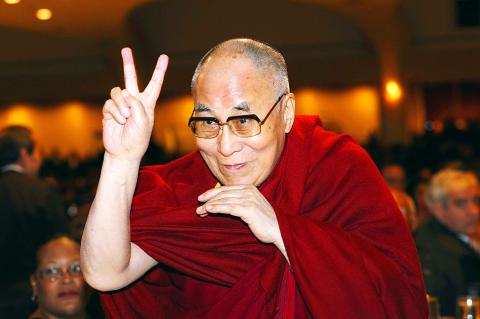US President Barack Obama warmly acknowledged the Dalai Lama on Thursday, but did not meet him directly at a religious event in Washington closely watched by China, which has warned against any exchange with Tibet’s exiled spiritual leader.
Obama and the Dalai Lama were both at an annual prayer breakfast where Obama spoke about the importance of religious freedom.
Obama greeted the Buddhist monk with a bow-like gesture and called him “a good friend” and “a powerful example of what it means to practice compassion and who inspires us to speak up for the freedom and dignity of all human beings.”

Photo: Reuters
The Dalai Lama was in the audience at a table in the front row across from the president, along with senior Obama adviser Valerie Jarrett, a signal of White House support.
Obama nodded and smiled at the Dalai Lama, waving after clasping his hands to greet the spiritual leader as the event began.
China’s Ministry of Foreign Affairs, when asked about the event, repeated its opposition to any country “using the Tibet issue to interfere in China’s domestic affairs,” but did not directly condemn Obama, likely because there was no face-to-face meeting.
“The Dalai Lama is a political exile who has long waved the flag of religion to engage in anti-China separatist activities,” ministry spokesman Hong Lei (洪磊) told a daily news briefing.
The Dalai Lama has said he wants autonomy for Tibet and does not advocate violence.
The Chinese state-run Xinhua news agency took a strong line.
“Chumming with a secessionist is playing with fire,” it said.
Obama and the Dalai Lama are both Nobel Peace Prize laureates and have met three times.
At the event, Obama echoed some of the religious leader’s teachings, calling for religious tolerance and noting that too often, faith is twisted to justify violence.
“We see faith driving us to do right, but we also see faith being twisted and distorted, used as a wedge or, worse, sometimes used as a weapon,” he said, citing recent attacks in Pakistan and Paris.

AGING: As of last month, people aged 65 or older accounted for 20.06 percent of the total population and the number of couples who got married fell by 18,685 from 2024 Taiwan has surpassed South Korea as the country least willing to have children, with an annual crude birthrate of 4.62 per 1,000 people, Ministry of the Interior data showed yesterday. The nation was previously ranked the second-lowest country in terms of total fertility rate, or the average number of children a woman has in her lifetime. However, South Korea’s fertility rate began to recover from 2023, with total fertility rate rising from 0.72 and estimated to reach 0.82 to 0.85 by last year, and the crude birthrate projected at 6.7 per 1,000 people. Japan’s crude birthrate was projected to fall below six,

Conflict with Taiwan could leave China with “massive economic disruption, catastrophic military losses, significant social unrest, and devastating sanctions,” a US think tank said in a report released on Monday. The German Marshall Fund released a report titled If China Attacks Taiwan: The Consequences for China of “Minor Conflict” and “Major War” Scenarios. The report details the “massive” economic, military, social and international costs to China in the event of a minor conflict or major war with Taiwan, estimating that the Chinese People’s Liberation Army (PLA) could sustain losses of more than half of its active-duty ground forces, including 100,000 troops. Understanding Chinese

SELF-DEFENSE: Tokyo has accelerated its spending goal and its defense minister said the nation needs to discuss whether it should develop nuclear-powered submarines China is ramping up objections to what it sees as Japan’s desire to acquire nuclear weapons, despite Tokyo’s longstanding renunciation of such arms, deepening another fissure in the two neighbors’ increasingly tense ties. In what appears to be a concerted effort, China’s foreign and defense ministries issued statements on Thursday condemning alleged remilitarism efforts by Tokyo. The remarks came as two of the country’s top think tanks jointly issued a 29-page report framing actions by “right-wing forces” in Japan as posing a “serious threat” to world peace. While that report did not define “right-wing forces,” the Chinese Ministry of Foreign Affairs was

US President Donald Trump in an interview with the New York Times published on Thursday said that “it’s up to” Chinese President Xi Jinping (習近平) what China does on Taiwan, but that he would be “very unhappy” with a change in the “status quo.” “He [Xi] considers it to be a part of China, and that’s up to him what he’s going to be doing, but I’ve expressed to him that I would be very unhappy if he did that, and I don’t think he’ll do that. I hope he doesn’t do that,” Trump said. Trump made the comments in the context